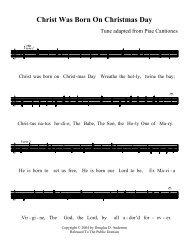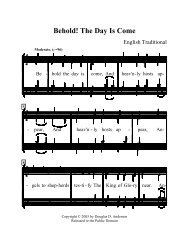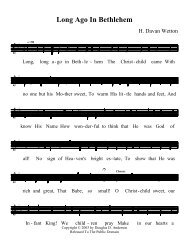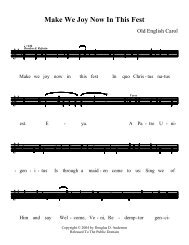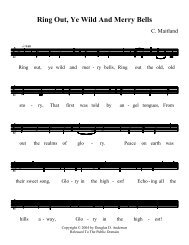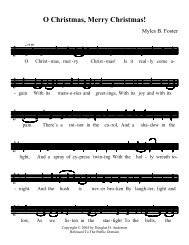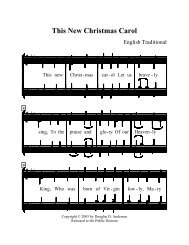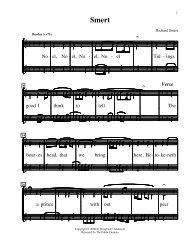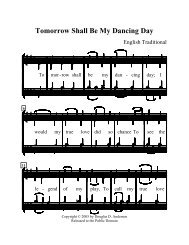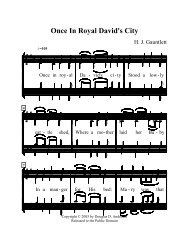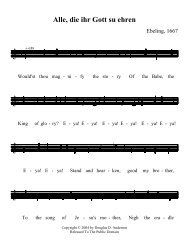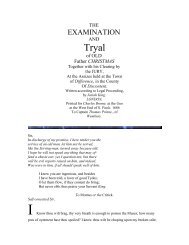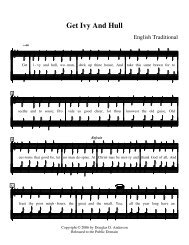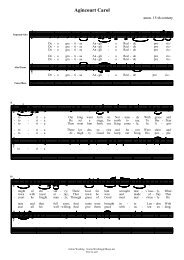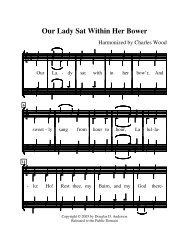Now, Now, The Mirth Comes - The Hymns and Carols of Christmas
Now, Now, The Mirth Comes - The Hymns and Carols of Christmas
Now, Now, The Mirth Comes - The Hymns and Carols of Christmas
You also want an ePaper? Increase the reach of your titles
YUMPU automatically turns print PDFs into web optimized ePapers that Google loves.
<strong>Christmas</strong> Poetry By Robert Herrick<br />
Several similar verses are found in Hesperides, a few <strong>of</strong> which are reproduced in the Appendix<br />
(“His Legacy”).<br />
Many <strong>of</strong> his short poems show us old <strong>Christmas</strong> customs, as Vizetelly notes:<br />
Among all our English poets, the one, who has left us by far the most complete<br />
contemporary picture <strong>of</strong> the <strong>Christmas</strong> season, was a country clergyman <strong>of</strong> the reign <strong>of</strong><br />
Charles I., who held a small living in a remote part <strong>of</strong> Devonshire.<br />
Herrick was also the author <strong>of</strong> many<br />
well-known romantic poems, including "To<br />
the Virgins, to Make Much <strong>of</strong> Time", which<br />
begins:<br />
Gather ye rosebuds while ye may,<br />
Old Time is still a-flying;<br />
And this same flower that smiles today,<br />
Tomorrow will be dying.<br />
<strong>The</strong> full text <strong>of</strong> this poem appears in the<br />
Appendix.<br />
<strong>The</strong> famous first line became the subject<br />
<strong>of</strong> several paintings, including this one by<br />
John William Waterhouse, (1909). Source:<br />
Wikipedia.<br />
Herrick's work was well known to later<br />
authors. Washington Irving, in the "<strong>Christmas</strong><br />
Day" sketch from his well-known Old<br />
<strong>Christmas</strong>, included the following passage:<br />
<strong>The</strong> service was followed by a <strong>Christmas</strong> carol, which Mr. Bracebridge himself had<br />
constructed from a poem <strong>of</strong> his favourite author, Herrick; <strong>and</strong> it had been adapted to<br />
an old church melody by Master Simon. As there were several good voices among the<br />
household, the effect was extremely pleasing; but I was particularly gratified by the<br />
exaltation <strong>of</strong> heart, <strong>and</strong> sudden sally <strong>of</strong> grateful feeling, with which the worthy Squire<br />
delivered one stanza: his eyes glistening, <strong>and</strong> his voice rambling out <strong>of</strong> all the bounds<br />
<strong>of</strong> time <strong>and</strong> tune:<br />
'Tis Thou that crown'st my glittering hearth<br />
With guiltlesse mirth,<br />
And giv'st me wassaile bowles to drink,<br />
Spiced to the brink:<br />
Page v



